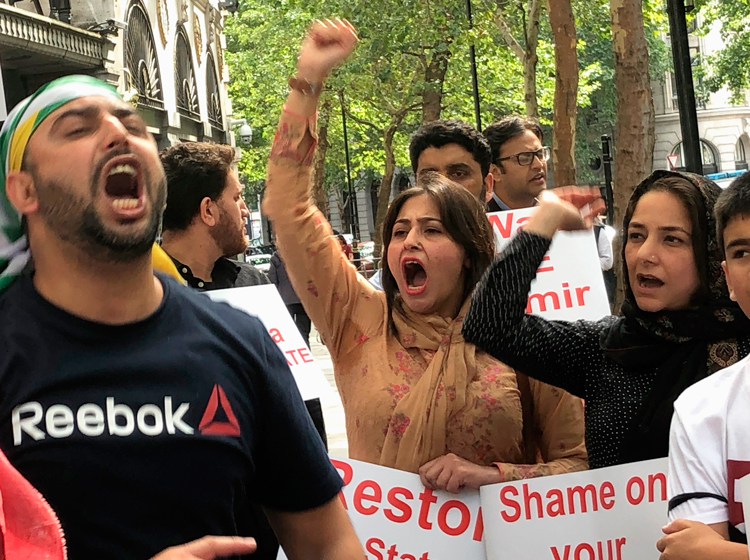BIRMINGHAM, England — Thousands have taken to the streets of Indian-occupied Kashmir to protest the imposition of direct rule by the Indian government. The actions are the latest in a decadeslong struggle by the Kashmiri people for self-determination that has claimed the lives of tens of thousands.
“We want freedom” and “Go India, go back!” chanted hundreds of demonstrators in Srinagar Aug. 12. Kashmiris will not stop fighting until we have won freedom, one young man told Dunya News, a Pakistan-based TV news channel Aug. 9. Solidarity demonstrations have taken place in the U.K.
“We must support the Kashmiri people against Indian aggression and the BJP party,” pharmacist Arif Khan, 38, told the Militant, echoing the sentiments of many others attending a demonstration here in Birmingham Aug 10.
The protests follow a decision by the Indian government of Narendra Modi to send tens of thousands of troops to join the hundreds of thousands already there to impose a curfew, close schools, block streets with razor wire and arrest hundreds, including two former chief ministers. All phone, TV and internet connection has been shut.
Kashmir, an oppressed nationality of some 14 million people, has been divided between India and Pakistan since 1947, with the rulers in both countries laying claim to the whole territory.
The seeds of the conflict over Kashmir were sewn by the British rulers as their colonial domination of India was ended by a mass movement of millions, led by a young working class that had begun to forge unity of the country’s many different nationalities and religions. The Labour Party government at the time protected the interests of the U.K.’s ruling families by pressing the dominant bourgeois and landlord forces in India to accept a majority-Muslim Pakistan and a majority-Hindu India — thwarting steps toward a unified nation-state and keeping the working classes divided and weakened.
The two new states immediately went to war over Kashmir. A U.N.-brokered peace deal divided Kashmir — two-thirds to India, today known as Jammu and Kashmir; one-third to Pakistan, called Azad Kashmir.
Pakistan’s rulers, feigning sympathy for the Kashmiris, have pressed their interests against their regional rivals and sponsored armed Islamist militias to carry out terror attacks against Indian forces. One such attack in February this year killed 46 paramilitary police. The Indian government has used such attacks as a pretext for extreme brutality against the Kashmiri people. There have been two further wars between the two capitalist states over the Kashmiri people and their land — in 1965 and 1990. During the last of these the Pakistani government put its nuclear arsenal on alert.
Seeking to gain popular support for partition, New Delhi granted a degree of autonomy to India-administered Kashmir: its own flag, the right to enact laws on matters other than foreign affairs, defense and communications. Indians from outside the region were blocked from owning property or getting government jobs. Women who marry someone from outside the area were prevented from inheriting property.
This 70-year status was abruptly ended Aug. 5 by the Indian government’s revocation of the constitutional arrangements. Modi claims Kashmir’s integration will provide jobs, economic development and prosperity and end discrimination against women. The move was welcomed by other capitalist parties and by the propertied rulers, such as mining magnate Gautam Adani. The main opposition Congress Party voiced some tepid criticism.
The Pakistan government of Imran Khan closed train services to, and downgraded diplomatic relations with, India, suspending bilateral trade. But it amounted to what the New York Times described as “high-level hand-wringing.” With China’s support, Pakistan is looking to the U.N. Security Council to press India to reverse its assaults.
Changing relations among rival powers
Relations between capitalist states in the region have changed since the Cold War, when Pakistan was aligned first with Washington and second with China; and India with Moscow.
Beijing has upgraded relations with the rulers in Pakistan. A 2015 visit by President Xi Jinping inaugurated $75 billion of Chinese investment in roads, railways, energy production and pipelines linking China to a port in the Pakistani city of Gwadar on the Arabian Sea. The transport corridor passes through Pakistan-occupied Kashmir. In December Beijing and Islamabad concluded their sixth joint military exercise.
Washington hosted a July visit to the U.S. by Pakistani Prime Minister Khan, offering to mediate with India over Kashmir. But the Indian government rejected the offer. The rulers there are a more reliable U.S. ally against the growing weight of Beijing. Washington and New Delhi have their own military exercises. President Donald Trump has not condemned Modi’s violation of Kashmiri rights, echoing U.N. calls for “restraint.” London has called for “calm.”


